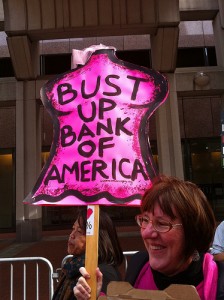
Brian Moynihan and pink bra
“Stripping Protestors In Pink Bras Crashed Bank Of America CEO Brian Moynihan’s Speech,” declared Business Insider on March 8, showing Moynihan’s stern photo with a pink bra playfully dangling in the air beside him.
It’s true, things did get a bit wild at Citi’s Financial Services conference at New York’s Waldorf Astoria when Brian Moynihan got on stage and began flipping through his tedious powerpoint.
While the hotel security was busy watching anti-bank protesters rallying outside, CODEPINK cofounder Jodie Evans, dressed in a hot pink bustier, burst into the conference room. “Bust up Bank of America before it busts up America”, she shouted, before being hauled out by security guards. “As I was saying,” continued a deadpan Moynihan to the laughter of the crowd, returning to the dreary slides that tried to put a rosy spin on this dinosaur of a company whose share price has plummeted while it continues to foreclose on families’ homes and faces tens of billions of dollars in damages from lawsuits over mortgage investments.
Little did Moynihan know that the excitement at what is normally a bankers’ snoozefest had just begun. CODEPINK codirector Rae Abileah and I were already seated in the front of the room. Wearing dark business suits, we did our best to blend into the crowd of stodgy white men in black business suits.
While Moynihan was bragging that Bank of America ended 2011 with the most capital, liquidity and reserves ever in its history, I calmly walked on stage and began to disrobe while Rae deftly jumped on a table in front of the stage. As we shed our jackets and shirts, the startled CEO suddenly found himself flanked by women in pink bras, with Bust up B of A scrawled on our chests.
Taking the mic away from Moynihan, I addressed the audience of bankers and institutional investors. “Today, March 8, is International Women’s Day, and on behalf of 99 percent of women in this country who are disgusted by the unbridled greed of the big banks, we say it’s time to Bust Up the Bank of America.” I kept talking about the bank’s misdeeds as security guards jumped on stage and dragged me into the hall. To my delight, I could hear Rae, who was left standing on the table in her pink bra, shouting over the boos of the audience. “Stop foreclosing on people’s homes; stop the predatory lending; stop funding dirty coal. Mr. Moynihan, how can you justify making millions while bankrupting America?” she asked, as the security guards dragged her away. Indeed, in 2011, while millions of Americans were jobless and homeless thanks to the bankers, Moynihan received over $6 million in compensation.

Bank of America protestor on International Women's Day Credit: Rae Abileah
This protest was one of many taking place at Bank of America branches around the country on International Women’s Day. Organized by CODEPINK, Women Occupy and Occupy Wall Street, the protests were meant to highlight the effects of the financial crisis on women and the fact that, four years into this crisis, the same problems exist.
In the afternoon, those of us in New York moved on to protest at the Bank of America branch located across the street from famous Zuccotti Park. While protesters gathered outside the bank, a few of us, including Rae and myself, went inside early. Just as the “bank busters” tried to make their way inside, the manager locked the doors and refused to let anyone else in.
With only a three of us inside, we didn’t know whether to proceed or bail. We decided to say a few chants, sing a Break Up the Banks song we had practiced, and then make a quick exit. We had just taken off our shirts and belted out a few chants when the police stormed in.
I gathered my belongings, ready to follow what I assumed would be a request to leave. Instead, the police treated me like I was about to rob the bank, pinning my arms behind my back and putting me in handcuffs. “We were never asked to leave, we were only exercising our right to free speech, we didn’t harm anyone or block any doors,” I argued to no avail.
Meanwhile Rae, who had run outside, was brutally tackled to the ground, her head smashed against the pavement. Crying and clearly in pain, she was roughly pulled up and cuffed. So was Monica Hutchins, who was arrested by the same out-of-control officer for merely marching and singing on the sidewalk. Occupy Wall Street activist Mark Adams, who had come to Rae’s aid, was also grabbed and arrested.
I later learned that the gentle, soft-spoken Mark Adams had personal reasons for protesting the bank, and for joining the Occupy Wall Street movement. His father had been approved for a mortgage by a small private lender, but then his dad got sick and passed away. Mark tried to keep the house, but the lender sold the loan to Bank of America who then foreclosed, leaving him homeless.
The four of us, arrested at 2:30pm on March 8, were taken to the local jail, where we were booked, and then transferred to the infamous clink known as “The Tombs.” We were locked up in a dirty, freezing cell with about 15 women who had been picked up on various charges like prostitution, shoplifting, drug dealing and domestic violence. All our possessions, including our jackets, had been taken away, so we were stuck in the freezing cell with no coats or blankets. The sleeping accommodations consisted of three dirty plastic mats—meant for one person each—thrown on the floor to “share” among all of us. We spent a long, sleepless night shivering in the cold.
The women in the cell were proud of us for standing up to the banks; so were some of the police. “They were arrested for protesting against foreclosures at Bank of America,” one of the policemen told a policewoman while I was being fingerprinted. “I’m with you there,” she said. “Those bankers are thieves. They take government money to bail them out but then they refuse to lend money to black women like me. I lost my house because I couldn’t get a bank loan, even though I have a good, steady job.”
Her case is all too common. And minority women who do get loans have been targeted with the most expensive, punitive and toxic loans. Women are 32% more likely than men to receive sub‑prime mortgages, and Latina and African-American women borrowers are the most vulnerable.
**********
After several rounds of fingerprinting, two iris scans, one disgusting peanut butter sandwich, and 26 hours in a cold cell, we finally got to see a judge. We were charged with two counts of trespassing, and have to return to court on March 30.
In jail, you see the stark contrast between those who create the economic havoc and those who really pay the consequences.
Meeting women locked up for such petty crimes as stealing a $40 bottle of perfume from Sephora, I thought about how much money CEO Brian Moynihan and his cronies have stolen from the American people. In fact, the very same day we were protesting, a whistleblower filed court documents charging Bank of America with knowingly and fraudulently seeking to limit homeowner mortgage modifications under the Home Affordable Modification Program.
Occupy Wall Street has been tapping into the anger against these unaccountable, “too big to fail” institutions, not only protesting against them but spurring a campaign to move many millions of dollars from Wall Street to Main Street. In the past year over a million Americans took their money out of big banks and opened accounts with credit unions. Credit union profit jumped 41 percent to $6.4 billion last year. The exodus continues this year, as greedy financial giants continue to squeeze their customers by hiking up fees.
While many of us are protesting, our government has failed to hold the banks accountable, prosecute the wrongdoers or restructure our financial system. The banks that were too big to fail then are even bigger now. The top 6 banks that had 7 trillion dollars in assets now have 9 or 10 trillion, and the Federal Reserve and the Treasury Department continue to prop up these behemoths, instead of breaking them up into smaller, more sustainable banks. The Dodd-Frank legislation passed to regulate the financial institutions is too cumbersome (2,300 pages compared to the 24-page Glass-Steagall Act); the big banks with their fancy lawyers can find all kinds of loopholes, while the smaller banks are now forced to pay for the avarice of the big ones.
Looking back on March 8, going to jail for justice was an appropriate way to commemorate a day that, starting in 1911, was a call by women workers for shorter hours, better pay, voting rights and an end to discrimination. Our foremothers like hell-raiser Mother Jones would certainly approve of standing up to rapacious banks and bankers. She might have even approved of the pink bras. After all, the feisty Mother Jones did have this advice for women: “Whatever your fight, don’t be ladylike.”
 Medea Benjamin is cofounder of www.codepink.org and www.globalexchange.org. Please join us in calling on the bank to drop the charges against us.
Medea Benjamin is cofounder of www.codepink.org and www.globalexchange.org. Please join us in calling on the bank to drop the charges against us.
